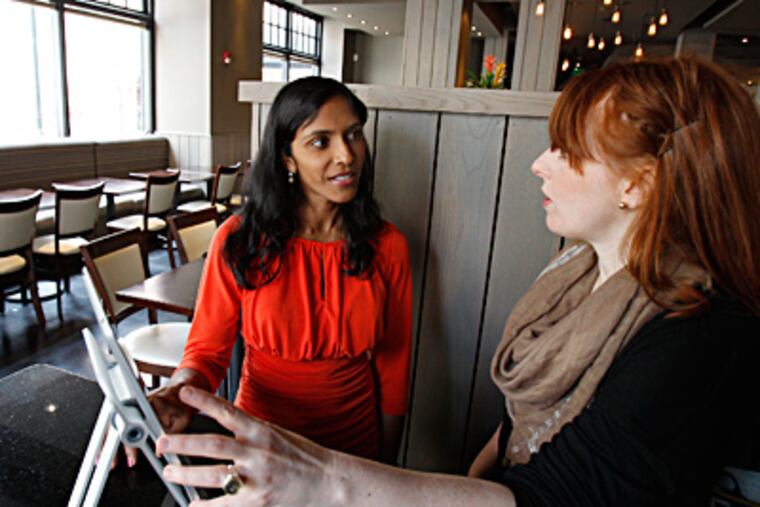Tech Life: OpenTable's rival to launch here
To restaurateur Bryon Phillips, the OpenTable online-reservation system is so essential that he can barely imagine doing without it.

To restaurateur Bryon Phillips, the OpenTable online-reservation system is so essential that he can barely imagine doing without it.
About half the patrons at Zama, the Japanese restaurant and sushi bar he manages on 19th Street, book their tables online. And almost all arrive via OpenTable, which over the last decade has made itself almost as attractive to diners as it is to restaurateurs — thanks to its convenience for finding a perfect place to eat, and to its popular frequent-diners program.
Persuading anyone to jump from a smoothly sailing ship is a tall order. But that's the goal of CityEats, a new OpenTable competitor with an impressive pedigree — it's a corporate cousin of the Food Network — that has made Philadelphia its second target market, after a November launch in Washington.
What distinguishes CityEats from OpenTable? Truth to tell, far less than what they share — except, of course, that CityEats went live here this week with about 30 restaurants and OpenTable claims more than 600 in the region and more than 230 in the city itself.
But CityEats' arrival offers a good chance to explore the business model that OpenTable pioneered when it was founded 14 years ago in San Francisco, and that now steers diners to more than 25,000 restaurants in six countries. CityEats isn't trying to reinvent the wheel so much as improve on it.
How do online-reservations systems such as OpenTable or CityEats work? Theoretically, so seamlessly that you should barely notice them, at least if your main goal is to make sure you can secure that table for two at an "it" restaurant like Center City's Jamonera or Vetri.
Go to Jamonera's own website, click on "reservations," and you'll wind up at OpenTable for the booking. The same thing happens if you click through from another site — say, an online restaurant review at Philadelphia magazine's website or Philly.com — or use a smartphone app to help you choose.
That seamless customer experience was the goal of Chuck Templeton, who founded OpenTable in 1998. But much of OpenTable's business actually takes place out of sight of consumers, where its computerized "electronic reservations book" has become the dominant tool for restaurants to manage customer flow.
OpenTable built its primary business by offering restaurants a deal: In return for a setup charge, a $199 monthly subscription fee, and a per-diner fee of $1 or 25 cents, depending on where the customer books, OpenTable provides software customized to a business. It maps its seating chart, factors in table-turn time, and helps a restaurant keep its house filled and customers happy. It even allows it to track customers' birthdays, wine tastes, or food allergies.
"I'm happy with it because the guests are happy with OpenTable," says Phillips, the Zama general manager, who adds he's staying put with OpenTable despite what he says is an expensive service in an industry known for tight margins. "It's kind of a cost of doing business nowadays."
So what is CityEats' pitch? That it does virtually everything OpenTable does, but with more flourishes and at a lower price.
CityEats president Sameer Deen says the system offers photos and sometimes even video to give customers a fuller sense of what to expect, along with menus, social-network links, restaurant descriptions, and customer reviews that are similar to OpenTable's. So far, it lacks a rewards system, but one is promised soon.
The idea is to mix ingredients offered by OpenTable, Zagat, and Yelp into a whole greater than the parts.
"What am I going to get on Friday evening? What's the crowd look like? What does the food look like?" Deen says. "What we're trying to do is bring in the atmosphere, the feel, the menu of the restaurant, so that a customer can feel, 'I'm really making a confident decision.'"
One well-regarded venue that has made a full leap to CityEats is Fish, which adopted the platform early, after moving in December to a larger location on Locust Street. General manager Nichole Berman says she likes the new system for its cloud-based flexibility — she can access data on an iPad or a computer, and from home as easily as from the host's station — and for the features that make its website more attractive.
Of course, she also likes the price — 75 cents per diner, or zero if they book via Fish's own website, and a monthly cap CityEats says should cut a restaurant's costs about 40 percent compared with OpenTable.
That hasn't been enough yet to persuade Munish Narula, owner of the modern Indian restaurant Tashan on South Broad Street. But he's considering it — and as of this week his customers will be able to book via either service. Narula credits CityEats with trying to build "a more intuitive and more flexible platform." But above all, he appreciates the competition, which he attributes to the backing of Food Network's parent, Scripps Networks. "These are the first guys who are actually making some waves."
Contact Jeff Gelles at 215-854-2776 or jgelles@phillynews.com.